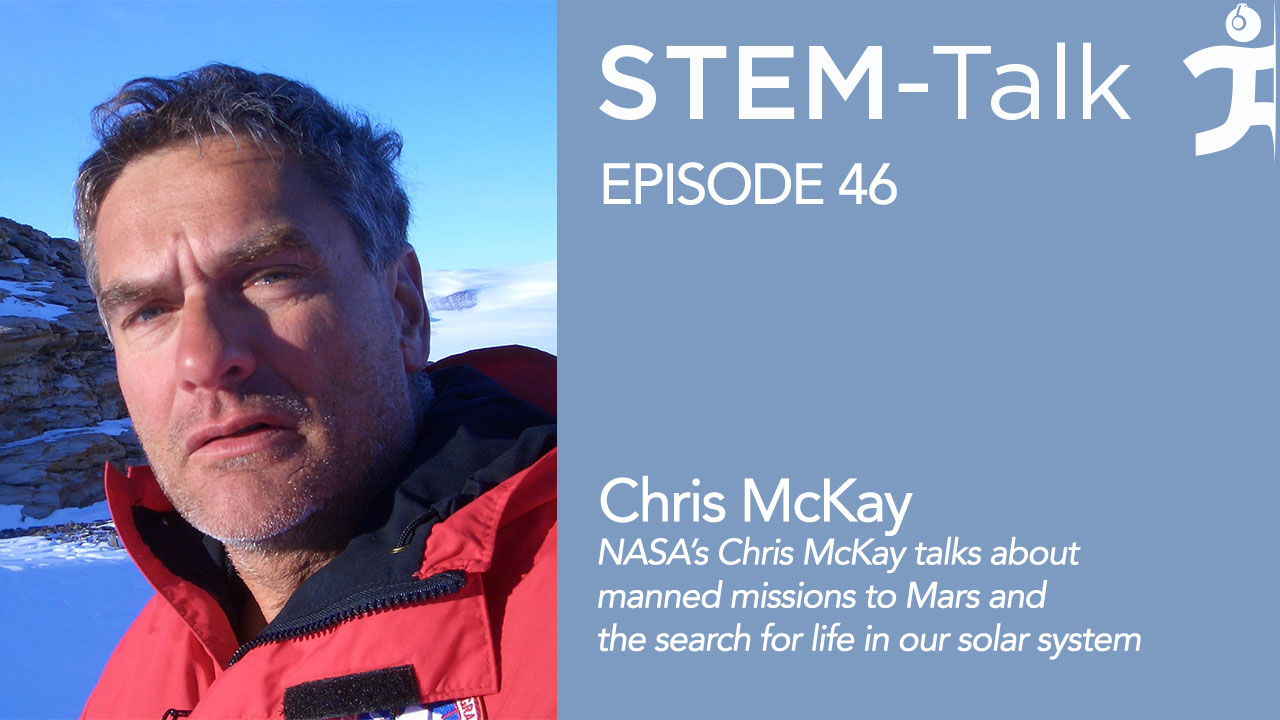STEM-Talk
Episode 46: NASA’s Chris McKay talks about the search for life in our solar system and travel to Mars
// Sep 12, 2017

IHMC STEM-Talk
Episode 46: NASA’s Chris McKay talks about the search for life in our solar system and travel to Mars
Today’s guest on STEM-Talk is Dr. Chris McKay, a leading astrobiologist and planetary scientist with the Space Science Division of the NASA Ames Research Center in California’s Silicon Valley.
Chris’s interview covers a diverse range of topics ranging from the origins of life to the possibility of manned missions to Mars.
For the past 30 years, Chris has been advancing our understanding of planetary science. He graduated from Florida Atlantic University in 1975 with a degree in physics and earned a doctorate in astrogeophysics at the University of Colorado in 1982. He was a co-investigator on the Huygens probe to Saturn’s moon Titan in 2005, the Mars Phoenix lander mission in 2008, and the current Mars Science Laboratory mission.
His research at NASA has focused on the evolution of the solar system and the origin of life. He also has been heavily involved in NASA’s Mars missions including the current Mars rover — Curiosity. In addition, Chris has thought deeply about the human exploration of Mars.
He has spent considerable time studying polar and desert environments to better understand how humans might survive in Mars-like environments. His research has taken him to the Antarctic Dry Valleys, the Atacama Desert, the Arctic, and the Namib Desert.
In 2015, the Desert Research Institute named Chris the Nevada Medalist, which is the highest scientific honor in the state.
Links:
STEM-Talk Episode 33, interview with NASA’s Natalie Batalha – https://www.ihmc.us/stemtalk/episode-33/
Chris McKay’s NASA profile page – https://spacescience.arc.nasa.gov/staff/chris-mckay/
Show Notes
3:53: Ken and Dawn welcome Chris to the show.
4:05: Dawn asks Chris if it is true that the television series Star Trek inspired him to take up science and start studying planets as a kid.
4:34: Dawn comments on how Apollo happened almost 50 years ago when Chris was a teenager and asks him where he was for Apollo 11 and what it meant to him.
5:24: Ken asks Chris how he learned about Florida Atlantic University, as it was a relatively new university at the time, and asks Chris why he chose it.
6:54: Dawn asks Chris if he was thinking about becoming an astronaut when he decided to major in physics.
7:27: Ken asks Chris what it was like to be a summer intern in the Planetary Biology program at the NASA Ames Research Center around 1980.
8:52: Dawn asks Chris how he chose the University of Colorado, where he earned a PhD in astrogeophysics.
10:42: Dawn asks Chris to discuss his transition from mechanical engineering to astrogeophysics.
12:11: Ken discusses how Chris ended up back at NASA Ames as an astrobiologist and planetary scientist after graduate school.
13:53: Dawn comments how Chris’s research is taking him to extreme places, and asks him to explain what extremophiles are and what their relevance is in the search for life beyond Earth.
17:26: Dawn comments on her experiences searching for extremophiles while working on cave diving projects.
18:12: Dawn asks Chris what his most recent search experience for extremophiles on our planet was.
19:49: Dawn asks Chris what he takes to be the most exciting extremophile discovery out of all of the work he has done.
22:40: Dawn asks Chris to talk about his favorite and least favorite aspects of field research.
24:06: Ken asks Chris to define some terms related to the search for life beyond Earth. Specifically, whether we have a definition for life itself and if not, what exactly we are searching for when we say we are searching for life. He also asks Chris to talk about alien life and how it differs from life on Earth.
26:21: Ken asks Chris how tough it would be to recognize alien life if it is based on fundamentally different chemistry than life on Earth.
29:16: Ken asks Chris where NASA’s secret alien life storage room is.
31:03: Ken asks Chris what the scientific importance of discovering life in another world is.
32:49: Dawn asks Chris where the most likely environment to hold life beyond Earth in our solar system is.
33:47: Dawn asks Chris what makes Mars an ideal candidate for life beyond Earth.
36:47: Ken discusses how we have been searching for life on Mars for decades, but how Chris questions the way we have been going about this. Chris was quoted to say, “If we are going to search for life, let’s search for life.” Ken asks Chris to explain what he means by this.
39:07: Dawn asks Chris what he thinks would happen if we did discovered life on Mars, and whether he thinks there would be a profound societal reaction.
40:57: Ken asks Chris if it is likely that life on Earth may have seeded life on Mars, or perhaps vice versa.
42:57: Dawn asks Chris what motivated his interest in the atmospheres of Titan.
45:14: STEMTALK BLURB
45:39: Ken asks Chris to talk about the search for life on Europa.
47:06: Ken comments that Chris has noted that life chooses, chemistry does not. He then asks Chris when we will be able to send capable robots to examine the chemistry of Titan or the other frigid satellites mentioned.
50:23: Ken asks Chris if the evidence for life on Titan is compelling enough to devote the resources to actually send a mission to look for it.
53:04: Dawn discusses how Chris has spent a lot of time over the past 30 years looking into the origin and evolution of life. She then asks Chris how his understanding of the origin of life has changed over these three decades.
54:46: Dawn asks Chris which place he thinks has the highest probability of having life beyond Earth.
56:19: Dawn asks Chris how returning samples from Mars would fit into human exploration.
58:18: Ken comments on how it makes sense that more experience with entry, descent, and landing on Mars would make the astronauts more comfortable.
58:29: Dawn asks Chris which he believes is going to happen first: discovering life elsewhere in the solar system or receiving a message from an extraterrestrial civilization.
1:00:12: Ken asks Chris to briefly discuss the Drake equation, a probabilistic argument used to estimate the number of active communicative extraterrestrial civilizations in our galaxy.
1:02:19: Ken discusses how he interviewed Chris’s colleague, Dr. Natalie Batalha, about the Kepler mission, exoplanets, and the possibility of life on STEM-Talk episode 33. He then asks Chris what he sees as the prospects for finding life on extra solar planets.
1:04:46: Dawn asks Chris if he has a favorite book about the search for extraterrestrial life.
1:05:56: Dawn comments on how Chris is an advocate of human exploration of Mars and asks him to discuss his reasons for that position.
1:07:18: Dawn asks Chris what his thoughts are on planetary protection, particularly the controversy regarding humans “contaminating” the surface of Mars.
1:09:19: Ken discusses how he believes that it is unfortunate that some regard any human expansion into the solar system as being an undesirable human infestation of previously pristine places.
1:11:40: Dawn asks Chris if humans were to live elsewhere in the solar system, where he thinks would be the most promising destination.
1:12:40: Ken comments on how Chris has given the notion of terraforming Mars a lot of thought and asks him to explain the concept of terraforming.
1:14:41: Ken asks Chris what it will take to terraform Mars, and whether or not Chris sees this as a realistic possibility.
1:17:03: Dawn discusses how Chris has nurtured an entire generation of students and asks him what it has been like for him to work with them.
1:18:32: Dawn asks Chris to explain what Mars Underground is, as he is one of the cofounders.
1:19:45: Dawn asks Chris what he would propose if he were in charge of NASA’s Mars strategy.
1:20:21: Ken and Dawn thank Chris for joining them on the show.






